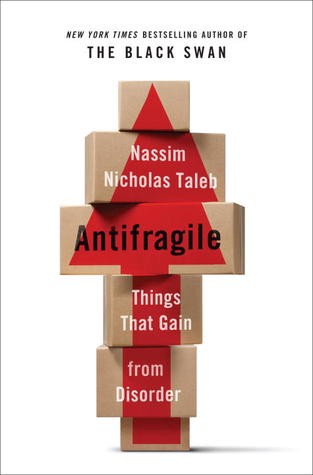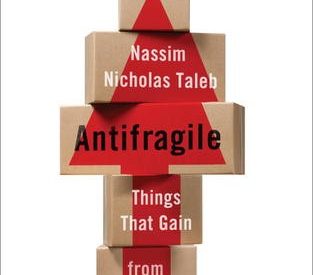
Taleb, of Black Swan fame, writes what is part great-idea-book, and part polemical-against-academics. I found it worth reading as it gave me another heuristic when thinking through decisions, even if I wasn?t willing to follow Taleb all the way through his numerous applications.
(One representative quote of the polemical components: ?History is written by the losers with too much time on their hands and a secure academic position.? Here I?ll focus on the ideas, leaving the discussion on academics for those who choose to read the book.)
The central idea is that anti-fragile things ? which benefit from randomness or variability ? exist, and that such things are distinct from the fragile ? which are harmed by it, and the robust ? which are left largely unchanged by it. In other words, anti-fragile things are those that have taken the maxim, ?That which does not kill me makes me stronger? literally. This idea is the central tenet of call options (where the buyer has the option to buy an asset at a later date at a fixed price, and so she benefits from volatility), and Taleb?s proposed contribution is arguing that such options exist in every domain.
The next idea is that people don?t recognize this anti-fragility, tending to overreact about small variations, and systems that try to minimize such small variations are especially vulnerable to black swan events. Consider the following examples from Taleb:
- Consider a long-term office worker vs a freelancer; during ?regular? years, the office worker has a consistent paycheck whereas that of the freelancer may vary month over month. However, the office worker is susceptible to permanent unemployment if she gets laid off, while the freelancer is less fragile to such extreme events.
- With evolution, a given species benefits with some variance of genes, as natural selection will pick the genes more amenable to survival; if there was no such variance, then a species would not change over time.
- In an anti-fragile economy, bad ideas and poor-performing companies are allowed to fail, strengthening the whole.
In between insulting decision and risk analysis academics and business school professors (well, those who don?t themselves take risks), Taleb applies this idea to government regulation, investing, and various other areas, even working out. [No one can accuse Taleb of being unable to transfer ideas across domains or of hesitance to speak in areas where he may not have expertise].
One approach to entrepreneurship (or anything that involves big bets) he suggests is to adopt a bi-modal risk profile: make sure you are comfortable with the absolute worst case, but then pursue a few big bets ? and that this approach is better than being ?medium risk? in everything, as the latter approach is susceptible to black swans. For example, he advocates holding most of one?s money in cash, and then put the remaining in high upside investments; for writers, he indicates that a day job unrelated to writing paradoxically frees one from the stress of having to write a popular bestseller, and thus improves one?s writing. Adam Grant makes the same point in Originals, saying that entrepreneurs (like the founders of Warby Parker) who at least at the beginning have good day jobs tend to be better at building sustainable companies.
One part that is somewhat unsatisfactory is regarding how to identify robust or anti-fragile things. Taleb partially appeals to naturalism or at least age, arguing that we can be quite sure that older things do not have unknown hidden black swan harms; if they did, they would have been found already. Applying this principle, Taleb doesn?t eat any fruits that don?t have an ancient Greek or Hebrew name and eschews as much modern medicine as possible.


